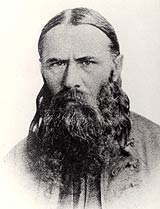
Samuel Bohdan Hroboň (1820 – 1894) was a significant Slovak poet, folklorist, translator, and linguist, representative of the messianic line of Slovak romanticism and evangelical author, theologian. He was born in Liptovska Sielnica as a member of one of the important Slovak evangelical educated families. He studied at the Evangelical Lyceum in Levoča. At that time he began to create his own poetry and also collect Slovak folk tales, adage and fairy tales. In 1839 he went to the Lutheran Lyceum in Bratislava. As it often happened with Slovak Protestant students of theology, along with his brother Ľudovít he continued studies at the University of Halle, Germany. He studied theology and philosophy. He was very active in organizing, as a student he became a member of the committee of the Czech-Slavic Society.
He wrote corresponded and became a friend of a famous Czech poet and teacher Antonia Reissová known under the pseudonym Bohumila Rajská with whom he also had a closer personal relationship. He wrote a collection of poems for her titled Kvetiny nadsalanske. He probably wasn’t quite indifferent to her but perhaps under the influence of the writer Božena Němcová Rajs eventually married a Czech intellectual and at that time an older widower F. L. Čelakovský.
After returning from his studies Hroboň was not fully involved in national life but he retreated to his birthplace. He founded a typical Štúr-based ant alcoholic society of mildness and he spent summers in Tatra mountains. During the 1848-1849 revolution he allegedly initiated the rebellion of subjects in Liptov and encouraged them to take their territory, their mountains from the nobility.
He was very poetic. His poems reflected the political and social reality of the time. His texts were in the spirit of romanticism, the all-Slavic reciprocity of the poet Ján Kollár and the Messianic expectation, the rise of the so called Christian Slavic Empire. Hroboň was also one of the first supporters of the codification of standard Slovak language which he, as a representative of the Štúr generation, defended from his unique philosophical point of view.
In private he lived cut off from the mainstream of the cultural life of his time. He suffered from schizophrenia at an advanced age. He could only write with his left hand and gradually lost his eyesight. Yet he was in correspondence with a number of prominent intellectuals and kept a large, though difficult to read, diary. At the end of his life he had up to 8,000 pages. In 1894 he died lonely and sick in his native village Liptovská Sielnica.
Author: L. Krajčír
Edited by: Ľ. Korenčík
English translation: P. Petrík
References:
KLEINSCHNITZOVÁ, Flóra: Z našej romantiky. Bratislava: Slovenský spisovateľ. Bratislava, 1958.
ČEPAN, Oskár: Literárne bagately. Bratislava: Tatran, 1971, pp. 48 — 59.
ČEPAN, Oskár: Romantický mesianizmus a Samo B. Hroboň. In: K problematike slovenského romantizmu. Martin: Matica slovenská, 1973, pp. 95 — 127.
ĎURIŠKA, Zdenko: Pôvod a príbuzenské vzťahy Hroboňovcov. In: Genealogicko-heraldický hlas, year 5, 1995, nr. 1, pp. 18 — 29.
HLEBA, Edmund: Doslov. In: S. B. Hroboň: Slovenské iskrice. Bratislava: Tatran, 1991.
KOVALČÍK, Vlastimil: Rozružie alebo Samo Bohdan Hroboň, Bratislava: Vydavateľstvo Spolku slovenských spisovateľov, 2002.
